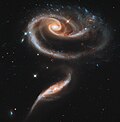Search results
The page "Gravitational radiation astronomy" does not exist. You can create a draft and submit it for review or request that a redirect be created, but consider checking the search results below to see whether the topic is already covered.
 Gravitational-wave astronomy is a subfield of astronomy concerned with the detection and study of gravitational waves emitted by astrophysical sources...44 KB (4,691 words) - 06:08, 24 April 2024
Gravitational-wave astronomy is a subfield of astronomy concerned with the detection and study of gravitational waves emitted by astrophysical sources...44 KB (4,691 words) - 06:08, 24 April 2024- gravitational waves. In gravitational-wave astronomy, observations of gravitational waves are used to infer data about the sources of gravitational waves...104 KB (12,635 words) - 17:57, 16 April 2024
 Cosmic microwave background (redirect from Primordial gravitational wave)bang, and the second generated by gravitational lensing at later times. Primordial gravitational waves are gravitational waves that could be observed in...107 KB (12,906 words) - 13:52, 23 April 2024
Cosmic microwave background (redirect from Primordial gravitational wave)bang, and the second generated by gravitational lensing at later times. Primordial gravitational waves are gravitational waves that could be observed in...107 KB (12,906 words) - 13:52, 23 April 2024 Gravity (redirect from Gravitation (astronomy))physics. Gravitation, also known as gravitational attraction, is the mutual attraction between all masses in the universe. Gravity is the gravitational attraction...69 KB (7,367 words) - 09:14, 14 April 2024
Gravity (redirect from Gravitation (astronomy))physics. Gravitation, also known as gravitational attraction, is the mutual attraction between all masses in the universe. Gravity is the gravitational attraction...69 KB (7,367 words) - 09:14, 14 April 2024- entropy formula is reproduced. However, quantum gravitational corrections to the entropy and radiation of black holes have been computed based on the theory...52 KB (6,878 words) - 03:49, 25 April 2024
 sphere Ergosphere Hawking radiation Penrose process Bondi accretion Spaghettification Gravitational lens Models Gravitational singularity (Penrose–Hawking...42 KB (3,389 words) - 04:49, 3 April 2024
sphere Ergosphere Hawking radiation Penrose process Bondi accretion Spaghettification Gravitational lens Models Gravitational singularity (Penrose–Hawking...42 KB (3,389 words) - 04:49, 3 April 2024- The gravitational wave background (also GWB and stochastic background) is a random background of gravitational waves permeating the Universe, which is...18 KB (1,896 words) - 11:52, 20 March 2024
- as gravitational lenses, a claim confirmed in 1979 by observation of the Twin QSO SBS 0957+561. Unlike an optical lens, a point-like gravitational lens...51 KB (5,719 words) - 15:22, 22 March 2024
 A gravitational singularity, spacetime singularity or simply singularity is a condition in which gravity is predicted to be so intense that spacetime...23 KB (2,856 words) - 01:07, 10 February 2024
A gravitational singularity, spacetime singularity or simply singularity is a condition in which gravity is predicted to be so intense that spacetime...23 KB (2,856 words) - 01:07, 10 February 2024 page contains a list of observed/candidate gravitational wave events. Direct observation of gravitational waves, which commenced with the detection of...201 KB (6,063 words) - 07:59, 25 April 2024
page contains a list of observed/candidate gravitational wave events. Direct observation of gravitational waves, which commenced with the detection of...201 KB (6,063 words) - 07:59, 25 April 2024- known as gravitational lensing, can make background objects appear to an observer to take on a ring or arc shape. gravitational-wave astronomy A branch...160 KB (18,354 words) - 13:10, 19 April 2024
 LIGO (redirect from Laser Interferometer Gravitational-Wave Observatory)Interferometer Gravitational-Wave Observatory (LIGO) is a large-scale physics experiment and observatory designed to detect cosmic gravitational waves and...88 KB (8,295 words) - 02:19, 22 April 2024
LIGO (redirect from Laser Interferometer Gravitational-Wave Observatory)Interferometer Gravitational-Wave Observatory (LIGO) is a large-scale physics experiment and observatory designed to detect cosmic gravitational waves and...88 KB (8,295 words) - 02:19, 22 April 2024 Black hole (redirect from Gravitationally completely collapsed star)R. M. (1997). "Gravitational Collapse and Cosmic Censorship". In Iyer, B. R.; Bhawal, B. (eds.). Black Holes, Gravitational Radiation and the Universe...165 KB (18,702 words) - 01:43, 18 April 2024
Black hole (redirect from Gravitationally completely collapsed star)R. M. (1997). "Gravitational Collapse and Cosmic Censorship". In Iyer, B. R.; Bhawal, B. (eds.). Black Holes, Gravitational Radiation and the Universe...165 KB (18,702 words) - 01:43, 18 April 2024- Tests of general relativity (redirect from Gravitational deflection of light)of the perihelion of Mercury, the bending of light in gravitational fields, and the gravitational redshift. The precession of Mercury was already known;...103 KB (12,446 words) - 16:02, 22 April 2024
 Star (redirect from Star (astronomy))protoplanetary disk and powered mainly by the conversion of gravitational energy. The period of gravitational contraction lasts about 10 million years for a star...146 KB (16,321 words) - 21:30, 23 April 2024
Star (redirect from Star (astronomy))protoplanetary disk and powered mainly by the conversion of gravitational energy. The period of gravitational contraction lasts about 10 million years for a star...146 KB (16,321 words) - 21:30, 23 April 2024
- student who has at least an elementary knowledge of physics or astronomy gravitational attraction is one of the best known properties of matter; and it
- philosophers had become so accustomed to Newton's law of gravitation, and to the equality of gravitational and inertial mass, that the miraculousness of it was
- Thermal Radiation The Doppler Effect Telescopes Basic Optics Optical Telescopes Telescopes of Other Wavelengths Neutrino Telescopes Gravitational Wave Telescopes














